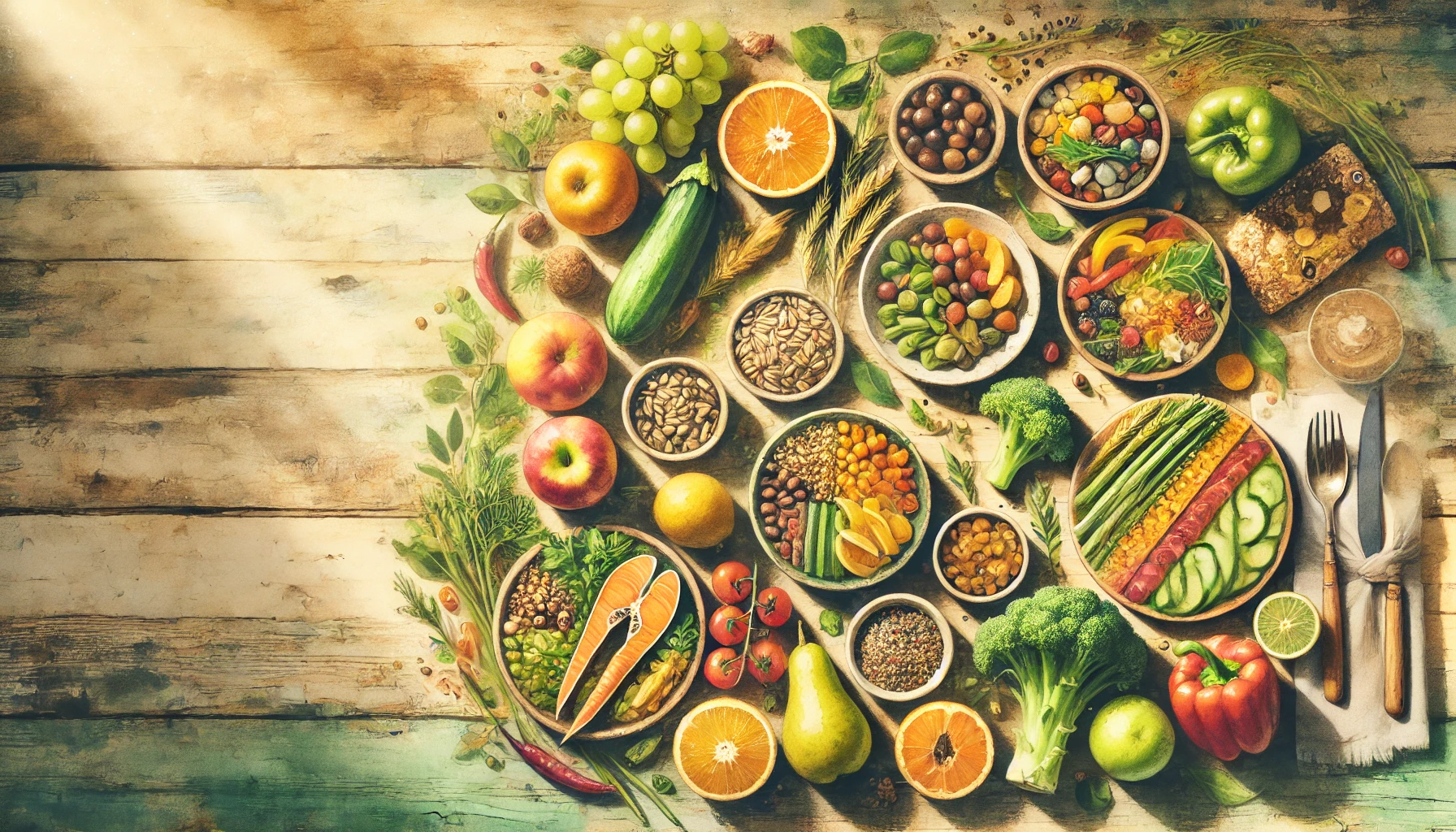In today’s busy world, prioritizing health often falls to the wayside. However, adopting a balanced diet is one of the most empowering steps toward a fulfilling life, energizing both body and mind. Healthy eating isn’t just about following strict diets; it’s about developing a relationship with food that nourishes you physically and emotionally. Below are insightful tips and quotes to help you understand the importance of a balanced diet and inspire a positive change. Whether you’re looking to improve your lifestyle, reduce stress, or simply enjoy a greater sense of well-being, these words will guide and uplift you on the journey.
Table of Contents
The Power of a Balanced Diet
“A healthy outside starts from the inside.” — Robert Urich
This simple yet profound idea reminds us that self-care truly begins with what we put into our bodies. Food not only fuels us, but it also has a direct impact on our mental well-being, energy levels, and productivity. When we eat well, we perform better and live happier lives.
Nourishment for Mind and Body
- “Let food be thy medicine and medicine be thy food.” — Hippocrates
Ancient wisdom emphasizes the power of food in healing and maintaining health. Choosing wholesome foods can boost immunity, improve mood, and keep chronic diseases at bay. - “To eat is a necessity, but to eat intelligently is an art.” — François de La Rochefoucauld
In the hustle and bustle of life, it’s easy to grab what’s quick and easy. However, being mindful about our food choices is crucial to leading a healthier life. - “The food you eat can either be the safest and most powerful form of medicine or the slowest form of poison.” — Ann Wigmore
Each meal is a choice, and healthy eating is a preventative approach to long-term health.
Fuel for Productivity
- “Healthy eating is a way of life, so it’s important to establish routines that are simple, realistically, and ultimately livable.” — Horace
Consistency is key. Developing sustainable eating habits is more beneficial than quick fixes or strict diets that are hard to maintain. - “You are what you eat, so don’t be fast, cheap, easy, or fake.” — Unknown
When we focus on quality, our body responds positively, rewarding us with higher energy levels, clarity, and productivity. - “What we eat truly influences every fiber of our being. Making conscious choices about food is self-respect in action.” — Dr. Mark Hyman
Our daily choices impact how we feel and how we age. Choosing nourishing foods can protect us from common ailments, lifting our spirits and strengthening our resilience.
Cultivating a Positive Relationship with Food
- “Eating well is a form of self-respect.” — Unknown
Valuing ourselves means making choices that reflect care and respect for our well-being. - “If we’re not willing to settle for junk living, we certainly shouldn’t settle for junk food.” — Sally Edwards
This quote emphasizes the importance of quality over convenience when it comes to our food. - “Food is not just fuel; it’s information. It talks to your DNA and tells it what to do. The most powerful tool to change your health, environment, and entire world is your fork.” — Dr. Hyman
Understanding that food is more than just calories can transform the way we approach eating.
Practical Tips for Balanced Eating
Incorporating these inspiring perspectives on food into daily life is achievable with simple, consistent changes. Here are some actionable tips:
- Plan Ahead: Prepare meals and snacks in advance to ensure you have access to healthy choices throughout the day.
- Practice Portion Control: Aim to balance your plate with a variety of nutrients without overeating.
- Mindful Eating: Slow down, savor your food, and pay attention to your hunger cues to avoid overindulgence.
Quotes on the Benefits of Whole Foods
- “Whole foods are the basis for a healthy diet; refined foods and sugars should be treated as occasional treats.” — Michael Pollan
Staying close to the natural form of food provides essential nutrients that help the body function at its best. - “Vegetables are a must on a diet. I suggest carrot cake, zucchini bread, and pumpkin pie.” — Jim Davis
A humorous reminder that incorporating more fruits and veggies can be enjoyable and delicious! - “Eating nutritious food should be as easy as breathing. Good choices should be made easy and accessible.” — Marion Nestle
Choosing whole foods is simpler when it’s made a regular habit and enjoyable part of life.
Balance, Moderation, and Enjoyment
- “Don’t focus on being perfect, just focus on being better than yesterday.” — Unknown
Healthy eating is about progress, not perfection. Each meal is an opportunity to make a positive choice. - “Good food is the foundation of genuine happiness.” — Auguste Escoffier
Healthy eating habits form the base for a content and vibrant life. - “It’s not just about diet. It’s about balanced living.” — Unknown
A reminder that health encompasses more than food—it includes sleep, exercise, and mental well-being.
Finding Joy in Healthy Eating
Embracing healthy eating can bring a sense of joy and fulfillment, allowing us to be more present and energized in our lives. Finding creative ways to prepare meals and enjoying the process of cooking can transform eating from a task into a nourishing ritual.
“Cooking is love made visible.” — Unknown
Preparing our meals mindfully allows us to show care not only for ourselves but also for loved ones. Sharing food has always been a way to build connections, celebrate milestones, and create memories.
Why Healthy Eating Matters
Healthy eating isn’t about strict diets or depriving ourselves of the foods we love; it’s about making conscious, nutritious choices that benefit our overall well-being. Studies have shown that a diet rich in fruits, vegetables, whole grains, and lean proteins can improve mental clarity, regulate sleep patterns, and reduce the risk of chronic illnesses.
Tips for Building a Balanced Diet
- Prioritize Whole Foods
Whole foods, like fruits, vegetables, and whole grains, provide essential nutrients without added sugars or artificial ingredients. According to nutritionist Michael Pollan, “Eat food. Not too much. Mostly plants.” By focusing on unprocessed foods, we provide our bodies with the nutrients they need to thrive. - Embrace Mindful Eating
Taking time to savor each bite and listening to our hunger and fullness cues can prevent overeating and promote a healthy relationship with food. “Mindful eating” means slowing down and truly enjoying the experience of nourishing your body. - Include a Variety of Colors on Your Plate
Different colors in fruits and vegetables often indicate different vitamins and minerals, so aim for a rainbow on your plate. Foods like spinach, blueberries, sweet potatoes, and bell peppers each offer unique health benefits. - Balance Macronutrients in Every Meal
Carbohydrates, proteins, and fats each play a vital role in our diet. Ensure each meal includes a balance of these macronutrients to stabilize energy levels and support cellular health. - Stay Hydrated
Often overlooked, hydration is essential for our body’s functions. Drinking enough water supports digestion, skin health, and cognitive function. Experts suggest aiming for eight glasses a day, though individual needs may vary. - Limit Processed Foods
Processed foods are often high in added sugars, unhealthy fats, and preservatives. By limiting them, you reduce exposure to ingredients that may cause inflammation or energy crashes.
Actionable Steps for a Healthier Diet
Incorporating healthier eating habits doesn’t require an overnight overhaul. Here are some practical, manageable ways to improve your diet:
- Plan Meals Ahead of Time: Preparing meals in advance ensures you have nutritious options on hand, making it easier to stick to healthy choices.
- Shop Smart: Create a grocery list focused on whole foods to avoid impulse buys that may be less nutritious.
- Eat Regularly: Skipping meals can lead to overeating later on. Aim to eat balanced meals at regular intervals to maintain steady energy.
- Experiment with Healthy Recipes: Cooking at home lets you control ingredients, making it easier to avoid excessive sugars, salts, and unhealthy fats.
- Add Fiber for Fullness: High-fiber foods, such as oats, beans, and fruits, can help you feel fuller longer and support healthy digestion.
Cultivating a Positive Relationship with Food
Eating healthy also means cultivating a balanced, positive relationship with food. Recognize that food is fuel and can support both body and mind. Adopting this mindset can lead to more mindful choices, encouraging us to respect and value our bodies through the meals we prepare and consume.
“To eat is a necessity, but to eat intelligently is an art.” — François de La Rochefoucauld
Creating Sustainable Habits
Healthy eating is a lifelong journey, not a quick fix. By developing small, sustainable habits, you’re setting yourself up for long-term success. A few ideas include:
- Focus on Progress, Not Perfection: It’s okay to indulge now and then. Instead of striving for perfection, aim for balance.
- Find Joy in Cooking: Making cooking an enjoyable activity can motivate you to prepare nutritious meals at home.
- Listen to Your Body: Every individual’s nutritional needs are unique. Pay attention to how your body feels after eating different foods, and make adjustments based on your energy levels and mood.
Closing Thoughts: Embracing a Balanced Life
Healthy eating is about more than just physical health; it’s about nurturing the mind and soul. By making informed choices and embracing a balanced lifestyle, we not only strengthen our bodies but also enhance our overall quality of life. So, remember, a balanced plate is a balanced life.
References
- Harvard Health Publishing – The Nutrition Source: A resource offering science-backed guidance on various aspects of nutrition for better health.
https://www.hsph.harvard.edu/nutritionsource/ - Eat Right – Academy of Nutrition and Dietetics: Insights on building sustainable healthy eating habits.
https://www.eatright.org/

